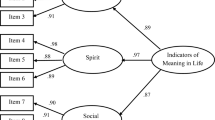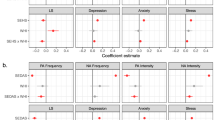Abstract
Moral behaviour has long been associated with well-being, but variables that may contribute to this association have been left unexplored. In this study the reconciliation model of moral centrality was used as a framework to investigate the relationship between morality and psychological health. According to this model, the inherent conflict between self-interest and morality can be transformed into a synergistic force through the development of moral centrality. Consequently, the integration of self-interest and morality is expected to positively influence psychological well-being. The present study examined eudaimonic well-being as a potential mediating variable in the link between moral centrality and mental health. Participants (N = 119) completed an online questionnaire consisting of open-ended questions and measures of depression, anxiety, self-esteem, eudaimonic well-being, and altruism. Moral centrality was defined as the integration of both agentic and communal values in their responses to open-ended questions. Moral centrality was associated with lower depression and anxiety, and with higher self-esteem, and these associations were mediated by eudaimonic well-being. Altruism was not associated with any of the measures of mental health. An exploratory analysis revealed that the specific integration of the agentic value achievement and the communal value benevolence may be the underlying factor explaining this relationship. These findings suggest that moral centrality may play a unique and meaningful role in promoting eudaimonic well-being and mental health. The results highlight the potential for fostering moral centrality to enhance mental health and well-being in clinical interventions.


Similar content being viewed by others
Data Availability
Data available on request from the authors.
References
Andrews, L. M. (1989). To thine own self be true the rebirth of values in the new ethical therapy. Doubleday.
Batson, D., Ahmad, N., Lishner, D., & Tsang, J. A. (2002). Empathy and Altruism. In C. R. Snyder, & S. J. Lopez (Eds.), Oxford Handbook of positive psychology (pp. 485–498). Oxford University.
Beck, A. T., Steer, R. A., & Brown, G. K. (1996). Manual for the Beck depression inventory (2nd ed.). Psychological Corporation.
Besser-Jones, L. (2016). Eudaimonism. In G. Fletcher (Ed.), The Routledge Handbook of Philosophy of Well-Being (pp. 187–196). Routledge.
Borgonovi, F. (2008). Doing well by doing good. The relationship between formal volunteering and self-reported health and happiness. Social Science & Medicine, 66(11), 2321–2334. https://doi.org/10.1016/j.socscimed.2008.01.011.
Buchanan, K. E., & Bardi, A. (2010). Acts of Kindness and Acts of Novelty Affect Life satisfaction. The Journal of Social Psychology, 150(3), 235–237. https://doi.org/10.1080/00224540903365554.
Covey, S. R. (1998). The 7 habits of highly effective people. Franklin Covey.
Dulin, P. L., & Hill, R. D. (2003). Relationships between altruistic activity and positive and negative affect among low-income older adult service providers. Aging & Mental Health, 7(4), 294–299. https://doi.org/10.1080/1360786031000120697.
Emmons, R. A. (1999). The psychology of ultimate concerns: Motivation and spirituality in personality. Guilford Press.
Frimer, J. A., & Walker, L. J. (2009). Reconciling the self and morality: An empirical model of moral centrality development. Developmental Psychology, 45(6), 1669–1681. https://doi.org/10.1037/a0017418.
Frimer, J. A., Walker, L. J., & Dunlop, W. L. (2009). Values embedded in narrative (VEIN) coding manual. Unpublished manuscript. University of British Columbia.
Frimer, J. A., Walker, L. J., Dunlop, W. L., Lee, B. H., & Riches, A. (2011). The integration of agency and communion in moral personality: Evidence of enlightened self-interest. Journal of Personality and Social Psychology, 101(1), 149–163. https://doi.org/10.1037/a0023780.
Frimer, J. A., Walker, L. J., Lee, B. H., Riches, A., & Dunlop, W. L. (2012). Hierarchical integration of agency and communion: A study of influential moral figures: Influential moral figures. Journal of Personality, 80(4), 1117–1145. https://doi.org/10.1111/j.1467-6494.2012.00764.x.
Gustafson, L. W., Gabel, P., Hammer, A., Lauridsen, H. H., Petersen, L. K., Andersen, B., Bor, P., & Larsen, M. B. (2020). Validity and reliability of state-trait anxiety inventory in danish women aged 45 years and older with abnormal cervical screening results. BMC Medical Research Methodology, 20(1), 89. https://doi.org/10.1186/s12874-020-00982-4.
MacKinnon, D. P., Fairchild, A. J., & Fritz, M. S. (2007). Mediation analysis. Annual Review of Psychology, 58(1), 593–614.
Mahalik, J. R., Locke, B. D., Ludlow, L. H., Diemer, M. A., Scott, R. P., Gottfried, M., & Freitas, G. (2003). Development of the conformity to masculine norms inventory. Psychology of Men & Masculinity, 4(1), 3–25. https://doi.org/10.1037/1524-9220.4.1.3.
Martin, M. W. (2006). From morality to mental health: Virtue and vice in a therapeutic culture. Oxford University Press.
Peterson, J. B. (2018). 12 rules for life: An antidote to chaos. Penguin Random House.
Phelps, C. D. (2001). A clue to the paradox of happiness. Journal of Economic Behavior & Organization, 45(3), 293–300. https://doi.org/10.1016/S0167-2681(01)00147-0.
Post, S. G. (2005). Altruism, happiness, and health: It’s good to be good. International Journal of Behavioral Medicine, 12(2), 66–77. https://doi.org/10.1207/s15327558ijbm1202_4.
Robins, R. W., Hendin, H. M., & Trzesniewski, K. H. (2001). Measuring global Self-Esteem: Construct validation of a single-item measure and the Rosenberg Self-Esteem Scale. Personality and Social Psychology Bulletin, 27(2), 151–161. https://doi.org/10.1177/0146167201272002.
Rosenberg, M. (1965). Society and the adolescent self-image. Princeton University Press.
Rosenberg, M. (1979). Conceiving the self. Basic Books.
Rushton, J. P., Chrisjohn, R. D., & Fekken, C. (1981). Self-report altruism scale. Personality and Individual Differences, 7, 293–302. https://doi.org/10.1037/t06160-000.
Ryan, R. M., & Deci, E. L. (2000). Self-determination theory and the facilitation of intrinsic motivation, social development, and well-being. American Psychologist, 55(1), 68–78. https://doi.org/10.1037/0003-066X.55.1.68.
Schwartz, S. H. (1992). Universals in the content and structure of values: Theoretical advances and empirical tests in 20 countries. Advances in Experimental Social Psychology, 25, 1–65. https://doi.org/10.1016/S0065-2601(08)60281-6.
Schwartz, C., Meisenhelder, J. B., Ma, Y., & Reed, G. (2003). Altruistic social interest behaviors are associated with better mental health. Psychosomatic Medicine, 65(5), 778–785. https://doi.org/10.1097/01.PSY.0000079378.39062.D4.
Spielberger, C. D., & Gorsuch, R. L. (1983). State-trait anxiety inventory (form Y). Consulting Psychologists Press.
Tesser, A. (2000). On the confluence of self-esteem maintenance mechanisms. Personality and Social Psychology Review, 4(4), 290–299. https://doi.org/10.1207/S15327957PSPR0404_1.
Torrey, W. C., Mueser, K. T., McHugo, G. H., & Drake, R. E. (2000). Self-esteem as an outcome measure in studies of vocational rehabilitation for adults with severe mental illness. Psychiatric Services, 51(2), 229–233. https://doi.org/10.1176/appi.ps.51.2.229.
Wang, Y. P., & Gorenstein, C. (2013). Psychometric properties of the Beck Depression Inventory-II: A comprehensive review. Revista Brasileira de Psiquiatria, 35(4), 416–431. https://doi.org/10.1590/1516-4446-2012-1048.
Waring, D. R., & Philosophy (2012). Psychiatry & Psychology, 19(1), 25–35. https://doi.org/10.1353/ppp.2012.0011.
Waterman, A. (1990). Personal expressiveness: Philosophical and psychological foundations. Journal of Mind and Behavior, 11(1), 47–73.
Waterman, A. S. (1993). Two conceptions of happiness: Contrasts of personal expressiveness (eudaimonia) and hedonic enjoyment. Journal of Personality and Social Psychology, 64(4), 678–691. https://doi.org/10.1037/0022-3514.64.4.678.
Waterman, A. S., Schwartz, S. J., Zamboanga, B. L., Ravert, R. D., Williams, M. K., Agocha, B., Kim, V. Y., S., & Donnellan, B., M (2010). The questionnaire for eudaimonic well-being: Psychometric properties, demographic comparisons, and evidence of validity. The Journal of Positive Psychology, 5(1), 41–61. https://doi.org/10.1080/17439760903435208.
Acknowledgements
A special thank you to Hannah Lauzon for her efforts in coding the data for this research.
Author information
Authors and Affiliations
Corresponding authors
Ethics declarations
Conflict of interest
On behalf of all authors, the corresponding author states that there is no conflict of interest.
Ethical approval
All study procedures were approved by the Research Ethics Board at the University of Windsor (REB number: 36527).
Informed consent
All participants provided informed consent.
Additional information
Publisher’s Note
Springer Nature remains neutral with regard to jurisdictional claims in published maps and institutional affiliations.
Electronic supplementary material
Below is the link to the electronic supplementary material.
Rights and permissions
Springer Nature or its licensor (e.g. a society or other partner) holds exclusive rights to this article under a publishing agreement with the author(s) or other rightsholder(s); author self-archiving of the accepted manuscript version of this article is solely governed by the terms of such publishing agreement and applicable law.
About this article
Cite this article
Hoyda, J.J., Jarry, J.L. Moral centrality is associated with better mental health through eudaimonic well-being. Curr Psychol 43, 9130–9140 (2024). https://doi.org/10.1007/s12144-023-05080-4
Accepted:
Published:
Issue Date:
DOI: https://doi.org/10.1007/s12144-023-05080-4




